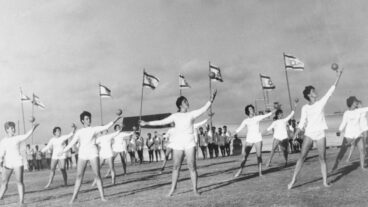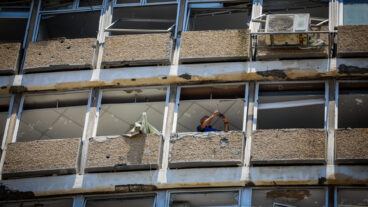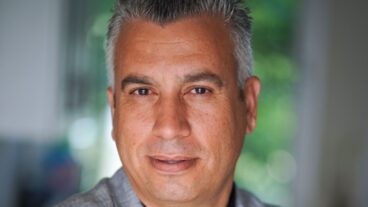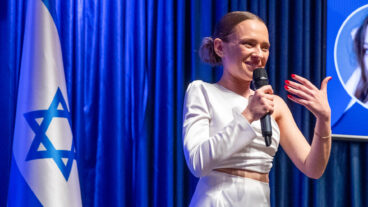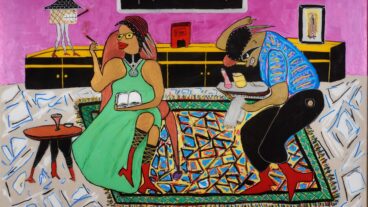A OneVoice voting booth manned by students is active in Tel Aviv.Over 113,000 Palestinians and Israelis have expressed their viewpoints in the OneVoice citizen negotiations since its launch in February. According to the organizers, Palestinians and Israelis are turning to the voting booth in thousands – for the first time ever – to have a say in how to resolve the conflict. Through a public negotiations platform created by OneVoice and supported by IBM, ordinary citizens are crafting a public consensus on the most contentious issues of creating a peace plan.
According to the organization, 58,032 Palestinians and 55,820 Israelis have participated in the OneVoice Public Negotiations Platform to date. Means of recruitment included focused workshops, door-to-door canvassing, voting booths at bus and train stations and other public places, internet voting, as well as recruitment by friends and colleagues at the workplace. In the most recent round, which began in mid-June and ended more than a month ahead of schedule on July 10, more than 40,000 new members.
“I’ve been totally astonished by the level of response so far, considering the modest amount of financial investment,” OneVoice’s Mohammed Darawshe told ISRAEL21c. “The fact that we’ve been able to generate over 113,000 responses is totally beyond our expectations. If we had more financial means to deploy more voting stations, and develop satellite connections and a media campaign, the results would have been ten times greater. But we hope to do all that in the future.”
According to preliminary results, three out four Palestinian and Israeli participants affirmed a two state solution. Palestinians and Israelis voted on ten specific proposals, including difficult questions dealing with the creation of two states, borders, settlements, occupation, terrorism, security, and the status of Jerusalem.
Specifically, according to data compiled after the first round of voting, 75.6% of Israelis and 75.8% of Palestinians unconditionally accepted the proposal that “there will be two viable states: Israel will be the state of the Jewish people and Palestine the state of the Palestinian people, each recognizing the other as such, both democratic and respecting human rights, including minority rights.”
Through the OneVoice weighted voting process, citizens negotiate with themselves and deal with ‘intractable’ issues in a manner that requires them to prioritize their protests. Over 90% of participants chose to use the weighted-vote-allocation system, rather than to simply vote yes or no for all questions, an indication of the seriousness with which they took the system. Weighted-votes take on average 15 to 30 minutes per participant.
The proposals that elicited the most contention were, predictably, on settlements, refugees, and Jerusalem, but Borders and Security also met some challenges.
The proposal that met the most Palestinian opposition was the one on settlements. “Do you agree that any peace agreement will be based on the principle of evacuating the settlements, excluding settlement blocks?” met with 74.4% opposition from Palestinians (and 37.16% opposition from Israelis). The main feedback that Palestinians provided on this issue was that the proposal was not clear or detailed and they did no’t know what “settlement blocks” were being referred to.
The proposal that met the most Israeli opposition was the one on Refugees, even though the language was extremely basic. The proposal “Do you agree that no peaceful solution will be achieved without a solution to the Palestinian Refugees?” met with 48.37% of opposition among Israelis and 39.62% opposition among Palestinians. The most prevalent qualitative feedback from those that rejected the proposal was that it wasn’t clear enough and many Israelis felt uncomfortable opening that door without knowing exactly what it would entail. Several complained about “ambiguous” and meaningless language.
The Jerusalem Proposal was accepted by a bare majority on both sides: 53% of Israelis and 51% of Palestinians accepted the formulation that “Arab East Jerusalem will be under Palestinian sovereignty while Jewish neighborhoods will be under Israeli sovereignty, and that each State shall have the right to establish its capital within its sovereign territory, recognized by the other and internationally.”
“Our results so far have shown that people in the region are expecting much more their leadership – whether it’s Sharon or Arafat, the leaders are not fulfilling their mandate which is to bring peace,” Darawshe said. “We’ve found tremendous traction in the wording that we’ve use – whether it be refugees, borders, land swap – they’re all acceptable by a great majority of the respondents. We’re talking about two thirds to three quarters who accept the basic premise of the solution which is not far away from that which resulted from the Taba negotiations and the Camp David followup.
“People are saying let’s get down to it – if there are hanging issues, then deal with them at a later stage, but for now don’t hold us hostages. They’re saying for us to continue paying the price of this stalemate is not a suitable price. What we’re finding in the results is people saying ‘enough is enough.’ Let’s look forward, and examine if we can nourish a partner on the other side, not just a partner that is willing to keep playing the same game,” he added.
The OneVoice public negotiations platform utilizes cutting edge technology contributed by the IBM Foundation, traditional canvassing on streets, a network of member organizations, and a broad cadre of spiritual and business leaders, dignitaries and celebrities, to engage Israelis and Palestinians to participate in crafting a public consensus around issues at the heart of the current conflict.
The process is designed to educate people about the issues themselves as well as about non-violent processes for conflict resolution. It aims to amplify the voice of moderates, invest them in the recognition that they need to stand up against violent absolutism, and help them seize back the agenda for conflict resolution. The initiative was launched in February in the presence of actor Jason Alexander who represented American support for the program.
Outreach workers canvassed and engaged Palestinian and Israeli citizens everywhere from refugee camps to universities, in spite of a charged atmosphere over the last six months.
The campaign extended across Israeli cities including Beersheva, Ofakim and Ashkelon in the South, Tel Aviv, Ramat Gan, Ra’anana, Kfar Saba, Hod Hasharon, Netanya, and Hadera in the Central Region, and Haifa, Acre, and Nahariya in the North. On the Palestinian side, recruitment span across cities, villages and refugee camps in the Bethlehem district, Hebron, Nablus, Jenin, Tulkarm, Ramallah, Kalkilya, and Jericho.
Early data compiled by OneVoice following the latest round of voting seems to indicate that voting also yielded even greater consensus than in the prior rounds. “Seeing that the proposals are changing to reflect voters’ feedback makes the people feel that this is important, said Roje Heinav, OneVoice’s Israeli Outreach Director.
“People are starting to believe they can have an impact,” added Nisreen Shaheen, OneVoice’s Palestinian Outreach Director.
The movement has been gaining momentum on both sides of the spectrum. Over 100 teenagers from ages 15 to 18 approached OneVoice and offered to recruit members in summer camps. The Israeli Employment Office, Youth and Educational Department, and the Youth Council facilitated the outreach. Several youth movements are driving the summer campaign on the Israeli front. Palestinian high school and university student groups are also very active with recruitment efforts.
According to one Palestinian canvasser, a mid-aged Palestinian man was approached to join the citizen negotiations. Before seeing the voting ballot, the man reacted with shock and screamed at him: ‘You are selling out our land openly and overtly!’ The field worker explained that OneVoice allows citizens to evaluate specific proposals and affirm or reject each of them, and asked him to at least take a look at the ballot. After 20 minutes of reading the document and thinking about it, the man filled out the form. The field worker was surprised to note that the man had accepted every one of the 10 proposals.
The most common complaint is that the questions are too long, or that they contain two clauses, one favorable to them and one favorable to the other side, forcing them to compromise on something they may not want to, but Darawshe says this can work both ways.
“What we have here is people who have invested 20-30 minutes on filling out their ballots. That means that they’ve taken it seriously, it’s not just going in and giving one vote or filling out your name. It’s a long, thorough discussion, and we want to take it even deeper,” he said. “We might get less votes in the short run, but they’ll be votes by people who thought long and hard about the issues. It’s a chance for people to really look inside and dialog with themselves. On this level, we’ve accomplished tremendous goals and have proven that this method does facilitate deep discussion and arguments.”
According to Darawshe, the next phase for OneVoice includes canvassing for more Israelis and Palestinians to join the balloting, and to broaden the scope of the grassroots leadership of the organization. To that extent, they’re hosting a meeting this week of Israeli and Palestinian student leaders.
“We’re attempting to develop leadership training of conflict resolution leaders, to widen the leadership of our organization, so there won’t be 5 or 10 from each side but 400 or 500. This will generate the spark of a mass movement which will yield pressure on the political system to move forward, and will create a network of ordinary Israelis and Palestinians to revive the people to people dialog that has been damaged – even assassinated – over the last four years,” he said.
“The meeting this week in Jerusalem will consist of 10-15 Palestinian and 10-15 Israeli student leaders from student unions, in which they’ll discuss leadership roles students can play in conflict resolution.”




